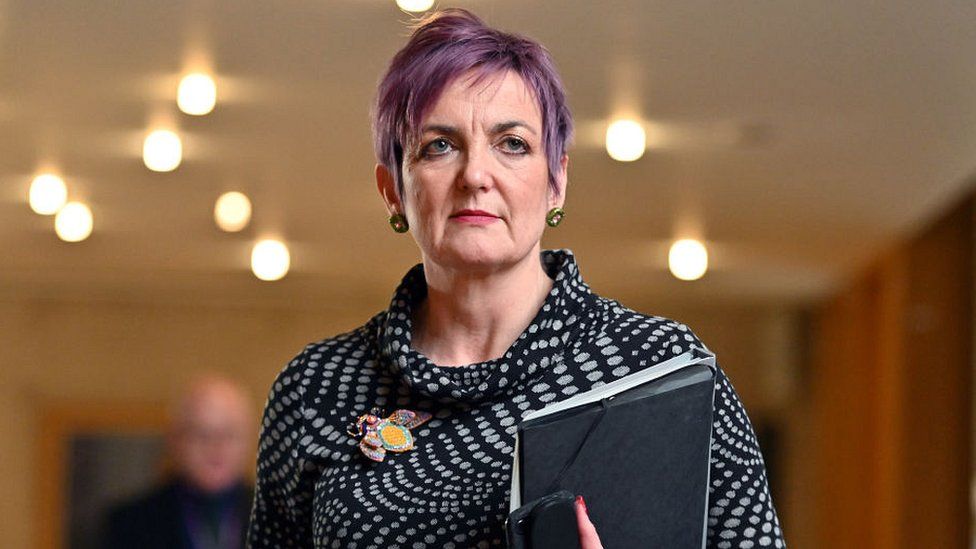 Image source, Getty Images
Image source, Getty Images
Scotland's justice secretary Angela Constance said it was a "landmark" bill
By Megan Bonar
BBC Scotland News
A bill that proposes major changes to Scotland's criminal justice system will be debated by MSPs at Holyrood later.
If passed, it would see the abolition of Scotland's not proven verdict.
The Victims, Witnesses, and Justice Reform (Scotland) Bill would also see the number of jurors in criminal trials reduced from 15 to 12, and could also see rape cases held without a jury.
Justice secretary Angela Constance has described the bill as "landmark and historic".
It aims to make the Scotland's justice system better for victims of crime, but it has proved controversial.
Why is the bill controversial?
The bill is still in the early stages of the legislative process and will be debated in Holyrood for the first time.
It has already been scrutinised by the Scottish parliament's criminal justice committee, which had split opinions on certain parts.
Committee convener Audrey Nicoll MSP said they agreed with the bill's general principles on the basis that it is designed to improve the system for victims and witnesses, but believe further evidence, data and scrutiny is required.
The committee stated it had not heard "compelling evidence" to support some of the proposals, in particular the changes to juries.
In response, Angela Constance acknowledged the legislation would have to be amended, but added that there was a "consensus" that the bill has the potential to change the experiences of victims and witnesses, particularly in cases involving sexual offences."
The Scottish Solicitors Bar Association said 97% of defence lawyers would boycott the trial without jury pilot if it goes ahead, while Rape Crisis Scotland said it supported the move.
What reforms are proposed?
Image source, Getty Images
The Victims, Witnesses, and Justice Reform (Scotland) Bill contains a range of proposed reforms to the Scottish justice system.
The government says it aims to "improve the experience of victims and witnesses in the justice system", as well as making the justice system fairer and more transparent.
Proposals include scrapping Scotland's not proven verdict, smaller juries in criminal trials and stand-alone sexual offence courts.
A not proven verdict is one of three verdicts that can be returned in a criminal case in Scotland.
In legal terms it is an acquittal but critics claims it is confusing and can stigmatise the accused person as well as failing to provide closure for victims.
It would be removed as an option, meaning defendants could only be found guilty or not guilty.
The verdict is not available in any other part of the UK and campaigners have long been calling for it to be scrapped.
The bill also proposes a change to jury sizes. Currently, 15 people sit on a Scottish jury with a simple of majority of eight required for a conviction.
The bill proposes a smaller jury of 12 with a two thirds majority required for a guilty verdict.
A new specialist sexual offences court would also be created and a pilot project would see rape and attempted rape cases being held without a jury, with a single judge deciding whether or not the accused is guilty.
When could these changes happen?
The Scottish government has not provided a full timeline for the legislation process. After the bill is debated in parliament MSPs will decide whether to take it forward.
Amendments can then be suggested by members before another debate and final vote. That process could happen as soon as this year.
While the bill makes its way through parliament, the Scottish government has already started implementing measures to improve the experiences of witnesses.
Specialist suites to help children and vulnerable adults give evidence in serious criminal trials are being established following £2m of investment.
The Evidence by Commissioner (EBC) facilities allow vulnerable witnesses to give evidence away from the courtroom which can help reduce the risk of experiencing further trauma.
Angela Constance has announced plans for two new suites which will cover the north and south Strathclyde sheriffdoms, as well as Dumfries and Galloway.
It adds to the Scottish Courts and Tribunals Service's (SCTS) four existing suites located in Aberdeen, Edinburgh, Glasgow and Inverness.
Analysis by Jenni Davidson, BBC Scotland political reporter
The Victims, Witnesses and Justice Reform Bill sets out some of the biggest changes to the criminal justice system in Scotland in recent times.
If all that's proposed in the draft bill gets passed, it will be a major shake-up of the way court cases work in Scotland.
For some, that's just what's needed. For others, it's too big a risk.
Victims' groups point to the distress caused by the not proven verdict and low conviction rates for sexual offences. They say something needs to change.
Lawyers have made clear their total opposition to juryless trials. They have also raised concerns about changes to verdicts and juries and how that might affect conviction rates, either up or down.
The difficulty is in predicting not just what the effect of individual changes will be, but of how all these different changes might interact with each other.
Whatever is decided, it will take effect in live court cases, with real victims and real accused, and serious consequences for both, so the stakes are very high to get this right.
 (1).png)
 8 months ago
14
8 months ago
14


















